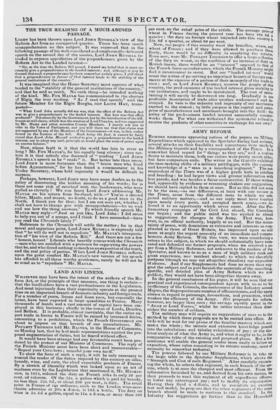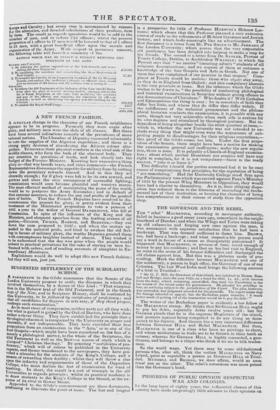ARMY REFORM.
BESIDES numerous approving notices of the papers on Military Expenditure which appeared in the Spectator during last autumn, several attacks on their feasibility and correctness were made by the Military Gazette and by a correspondent of the Timm In a somewhat blind regard for " things as they are," and a zealous desire to maintain them, both our critics were pretty much alike; but here comparison ends. The writer in the Gazette exhibited the case-making shifts of a military pettifogger, with the capacity and knowledge of a "man in a marching regiment." The cor- respondent of the Times was of a higher grade both in intellect and breeding : he had larger views and greater information with less parade, and was besides a fairer controvertist. If these writers
had, apparently by evidence or reasoning shaken our suggestions, we should have replied to them at once. But as this did not seem
to be the case,—as our differences, at least With our censor in the Times, arose from the different tests to which we sub- jected military matters,—and as our reply must have touched upon nearly every point, and occupied much space,—we de- e' ferred it to an opportunity which never came. After the Par- e. liamentary campaign of the Civil List closed, the Canadiam f. one begun ; and the public mind was too excited to attend
to suggestions for changes in the Army. That war, how. e ever, is, on official authority, happily at an end. But the uncer. tainty of peace, with dominions so extensive and interests so com- plicated as those of Great Britain, has impressed upon us still more stiongly the urgent necessity of an immediate and compre- hensive Army Reform. With this view, we were considering a
return to the subject, in which we should substantially have reite-
rated and defended our former proposals, when we received a pa- per from a Military Reformer, not unknown to the readers of the
Spectator, and known to us as a man of high military rank and
great experience, now resident abroad ; to which we cheerfully pottpone (though we may not altogether abandon) our exposition of abuses. And if our Supplements had done no more than sug- gest the subject and in part furnish the materials of the searching, specific, and detailed plan of Army Reform which we now publish, they would not have been altogether thrown away. In the general conclusions of his paper, it will be seen that our practical and experienced correspondent agrees with us as to the inefficiency of the Colonels, the uselessness of the Infantry second Majors, the disproportionate number of officers to melt, and the many abuses in regard to patronage, favouritism, and promotion, which
weaken the efficiency of the Army. His proposals for reform, however, are larger than ours ; the savings equally great in the "Army or Land Forces," whilst he rather increases than dim- nishes the number of soldiers.
The military man will require no suggestions of ours as to the methed by which these proposals are to be carried into effect. ite little will he wait for our praise of the familiar mastery which ani- mates the whole ; the minute and extensive knowledge poured Into the calculations and tabular exhibitions of pay; or the skis- letod analysis of what the Army is, and what it ought to be, in the comparative table of the existing and proposed plans. But a few sentences will enable the general reader more easily to follow an exposition, whose value consisting in its minute anatomy, must of necessity be somewhat technical.
The process followed by our Military Reformer is to take ue the large table in the Spectator Supplement, which shows the "Strength and Cost of each Regiment." After carefully examin- ing the whole, he selects that regiment, in each branch of the ser- vice, which is at once the cheapest and most efficient. From the
information furnished by us, and derived from his own means, be then proceeds to weed this regiment of all superfluous officers; to lower any extravagant pay ; and to modify its organization.
Having thus fixed a definite, awl in essentials an existing test and model, he proposes that the other regiinente of the same
branch should be made to conform to this standard. In the Infantry his suggestions go further than iii the Household
troops and cavalry ; but every step is accompanied by reasons fa the alteration, and detailed calculations of their produce, item by item. The result as regards quantities would be to add to the number of men, and to reduce 753 Aker, whilst the present proportion of 1 officer to 17 num would be lowered to that of 1 officer to 23 men, with a great betiefleial effect upon the morale and organization of the Army. 1,‘ ith respect to pecuniary amount, the following table will furnish a summary 4.1 the savnios WHICH MAY RE ErrEc.ri 0 WITHoUT REDUCING THE STRENGTH Ok"rilE ARMY.
GUARDS AND CAVALRY,
1, By reducing the useless expenditure of the Life Guar.'s, and remo-
delling the three Regiments
2. By equalizing the lumbers and remodelling the three Regiments of
Foot Guards 3. To remodel the Cavalry to an (improved) standard of the let Dracoun Guards, and replace the luetheient colonels hy eflieieut ones, would
give an increase of 164 horses and 157 soldiers, with a saying or INFANTRY, 4. To reform the 100 Regiments of the Infantry of the Line into 52 Batta- lions after the plan of several existing models, amongst others the Jet or Royal Regiment, at the S:11111. time modif!, in.: the monttera and pay of the officers. 41DI replacin4 the sineemist by effleient Colonels; as well as abolishing the agency and the clothing by the
Colonels
5. To abolish the Royal Staff Corps
£14,085 37.451 14,511
293.309 2,527 -- £361,893



























 Previous page
Previous page